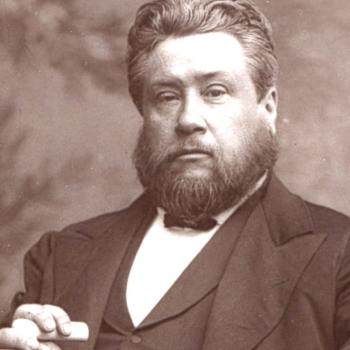It was also a delight to welcome to my blog last Monday, Dr. Martyn Lloyd-Jones, who although he is dead, continues to speak. Last week it was as though he was joining us on this journey through the T4G statement as he explained why it is vital for us to consider doctrine he could have been commenting on this introduction!
So, on to the statement. Let’s begin with a look at the introduction.
We are brothers in Christ united in one great cause to stand together for the Gospel. We are convinced that the Gospel of Jesus Christ has been misrepresented, misunderstood, and marginalized in many churches and among many who claim the name of Christ. Compromise of the Gospel has led to the preaching of false gospels, the seduction of many minds and movements, and the weakening of the church’s Gospel witness.
As in previous moments of theological and spiritual crisis in the church, we believe that the answer to this confusion and compromise lies in a comprehensive recovery and reaffirmation of the Gospel and in Christians banding together in Gospel churches that display God’s glory in this fallen world.
We are also brothers united in deep concern for the church and the Gospel. This concern is specifically addressed to certain trends within the church today.
We are concerned about the tendency of so many churches to substitute technique for truth, therapy for theology, and management for ministry.
We are also concerned that God’s glorious purpose for Christ’s church is often eclipsed in concern by so many other issues, programs, technologies, and priorities. Furthermore, confusion over crucial questions concerning the authority of the Bible, the meaning of the Gospel, and the nature of truth itself have gravely weakened the church in terms of its witness, its work, and its identity.
We stand together for the Gospel and for a full and gladdening recovery of the Gospel in the church. We are convinced that such a recovery will be evident in the form of faithful Gospel churches, each bearing faithful witness to the glory of God and the power of the Gospel of Jesus Christ.
These first few paragraphs made me think of the following verses from Philippians 1:27-28:
Only let your manner of life be worthy
of the gospel of Christ, so that whether I come and see you or am absent, I may hear of you that you are standing firm in one spirit, with one mind striving side by side for the faith of the gospel, and not frightened in anything by your opponents. This is a clear sign to them of their destruction, but of your salvation, and that from God.I think it is worth highlighting what this statement is NOT as far as I can tell:
-
It is not a complete systematic theology or a statement of faith addressing every important issue to which the Bible speaks.
-
It is not sufficient for a statement of faith or a doctrinal foundation for a church.
-
It is not intended to identify people as Christians, and not dependent on whether they can sign the document.
-
It is not (at least currently!) the foundation for a new organisation to complement or take the place of the modern denominations.
-
It is not a creed which must be accepted by all Christians.
-
It does not seek in itself to support each statement with Scripture.
The absence of certain points from the statement e.g. church government, the role of the Holy Spirit, baptism no doubt reflects areas about which these four guys still disagree rather than a statement that these things “don’t matter.” Clearly in a local church congregation there are all kinds of additional things about which agreement needs to be reached that this collection of articles does not address.
If we see this as something like a letter to the modern church from these four guys, then we are most likely going to approach it correctly. The very fact that this band of brothers recognise the need to write something like this shows that previous statements of faith have not been sufficient to protect the doctrine of the wider church. In all honesty, I have a certain amount of concern about the use of statements of faith in any context other than as a helpful summary of what we believe. Some people put too much confidence in them as a guardian of doctrinal purity.
What we find is that with the classical statements of faith or creeds, those who wish to lead the church in a different direction theologically are not usually stopped by a statement of faith. Of course, some will sign a document and then deliberately undermine the vows that they took, but others don’t do that instead they interpret around the issues they find difficult in the statement of faith. We have seen this in the UK where certain prominent evangelicals claim that the EA’s statement of faith does not exclude them despite the fact that
they disagree with substitutionary atonement!We have already seen across the internet that the document we are examining is capable of being misinterpreted. Let’s be careful that we do not invest too much faith in any such document. It is significant that God never left us with a complete doctrinal statement of faith in the Bible. What keeps the Gospel safe? I would argue two things predominantly – firstly an appropriate humble attitude to
the Bible itself, and secondly, the presence within the church of men like Mahaney, Dever, Mohler, and Duncan (and many others today) who preserve the apostolic foundation of doctrine through their teaching and direction of their own churches and those in relationship with them. Thus, for me, churches are built on people more than they are on pieces of paper.
So, with all these caveats, let’s take this statement as a helpful tool whereby we can discuss some of the issues raised within it. I do believe it is crafted in such a way that it brings to the fore many of the issues facing the wider church right now. It is, however, in our discussion of these articles, and more than that, in our preaching of some of these issues, that the church will be preserved rather than merely the existence of such a piece of paper.
The introduction of the statement speaks of standing for the Gospel. This is clearly a biblical concept, for the Bible is clear that there are those who will arise and pervert the true standard of treatment. I do have two slight areas of concern about this concept, however.
-
Standing for the Gospel must never take the place of proclaiming it.
-
Where are we called to stand for the Gospel?
It is right for us to stand for the Gospel. I am, at least personally anyway, not so concerned about even attempting to fight for it either in the wider church or in the cultural context. I think it is important for us to recognise that at least as far as the wider context is concerned the battle is already lost. What do I mean? Well, we cannot expect that every group of people who call themselves a church will believe the Gospel any more than we can expect the average unbeliever on the street to believe. Many groups which hold the name church have long since deserted any real understanding of the Christian message. Can such institutions be saved?
For me, at least, I feel the focus of my standing for the Gospel should be in my own
local church. I am totally committed to supporting the elders in their role in making sure that anti-Gospel tendencies do not arise within our congregation. I am also keen that we continue as a local church to be a part of a family of churches that is true to the Gospel. Beyond that, I try not to worry myself too much about what is going on in the rest of the wider church. I am sure that it is right for the T4G guys to fight some of these battles; I’m just cautious that we little local guys should not get too concerned with these big movements in the church as a whole.I am not convinced we can stop the tide that has led to the current state of affairs where the Gospel of Jesus Christ has been misrepresented, misunderstood, and marginalized in many churches and among many who claim the name of Christ. Compromise of the Gospel has led to the preaching of false gospels, the seduction of many minds and movements, and the weakening of the church’s Gospel witness.
Maybe because (with the exception of Mahaney) each of these guys are part of denominations where battles over the Gospel rage furiously, they raise this as a massive issue for them. I tend to support the views of both Spurgeon and Lloyd-Jones – where there is rejection of the Gospel that has gripped an entire movement, it is time for God-honouring Christians to leave that movement. I am convinced that many of our denominations are already past saving. Like Lloyd-Jones, I do not advocate merely forming a new denomination modeled on the old institutions, however something else is called for.
What then is the answer to the problems we face today? I agree with the writers of the T4G statement that We are convinced that such a recovery will be evident in the form of faithful Gospel churches, each bearing faithful witness to the glory of God and the power of the Gospel of Jesus Christ. There is no “Plan B”. It is in the local church that the hope for the lost exists. I believe that rather than formal denominations, informal associations of churches that gather around gifted individuals like a Mahaney, or for that matter, a Driscoll, are the way forward. I rely on the Spirit and the Word to summon forth leaders who can stand for the Gospel and craft out Gospel-faithful families of churches. I, for one, would rather throw my life into helping in one such local church and its circle of relationships with other churches and allow the storms of theological warfare to rage around us whilst locally we know the peace that comes from simply standing on God’s Word.
This post has grown too long already. There isn’t time for me to address here the areas of controversy that Dave Warnock has raised, but I am confident that most of these areas will arise again as we work our way through the statement, article by article. I certainly appreciate him for providing a clear statement of his concerns about the statement one of the delights of blogging is that we get to interact with real people who disagree with us rather than straw men of our own making. I suspect that what some disparagingly call the Warnock Wars will continue for some time to come since David, like me, seems determined to at least disagree with grace.
It is not too late for you to join us in our journey through these statements. Even this introduction has massive potential for controversy as Dave Warnock has shown us in
five posts on the T4G introduction. Remember a link to this post and some discussion on your blog about it could win you a free copy of John Piper’s God is the Gospel.











